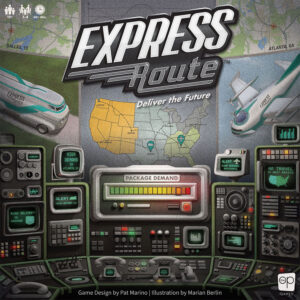 Family-weight co-op games have been popular since the inception of co-op games. Some of the behemoths of the hobby lie in this sphere: Pandemic, Sky Team, Horrified, Flash Point: Fire Rescue… the list goes on and on, growing larger each and every week with new releases and Kickstarters.
Family-weight co-op games have been popular since the inception of co-op games. Some of the behemoths of the hobby lie in this sphere: Pandemic, Sky Team, Horrified, Flash Point: Fire Rescue… the list goes on and on, growing larger each and every week with new releases and Kickstarters.
With so many of these titles releasing so rapidly, how does one break through the noise and establish itself among the titans of the industry? And more importantly, can Express Route reach those heights? Let’s find out!
Gameplay Overview:
In Express Route, 1-4 players will be cooperating together to deliver packages all across the Continental United States. As is tradition with co-ops, players can lose in several ways: here, players lose if the demand for packages to be delivered gets too high, or if they fail to deliver eight packages before the twenty-four Event Cards are revealed. Players win if they are able to deliver all eight packages, both hitting the extra demands found on the Delivery Requirement Tokens and keeping the losing conditions in check along the way.
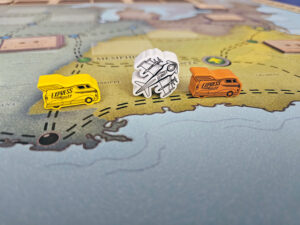
On a player’s turn, they will move one of the shared vehicle pawns, and/or pick up/drop off packages. Each package is required to start in a particular city, and is required to be delivered elsewhere. Turns are quite simple, with movement points for the shared pawns being different for each player, depending on how they decide to upgrade each pawn.
Speaking of upgrades, the upgrades in this game have huge impacts, but have a high cost: in order to purchase an upgrade, players must discard one of their delivered packages, thus cutting into their progression towards victory. Is it worth upgrading the carrying capacity of a particular vehicle’s pawn if it sets you back from victory?
Work together, upgrade wisely, and plan accordingly to win this tight, family-level, co-op game.
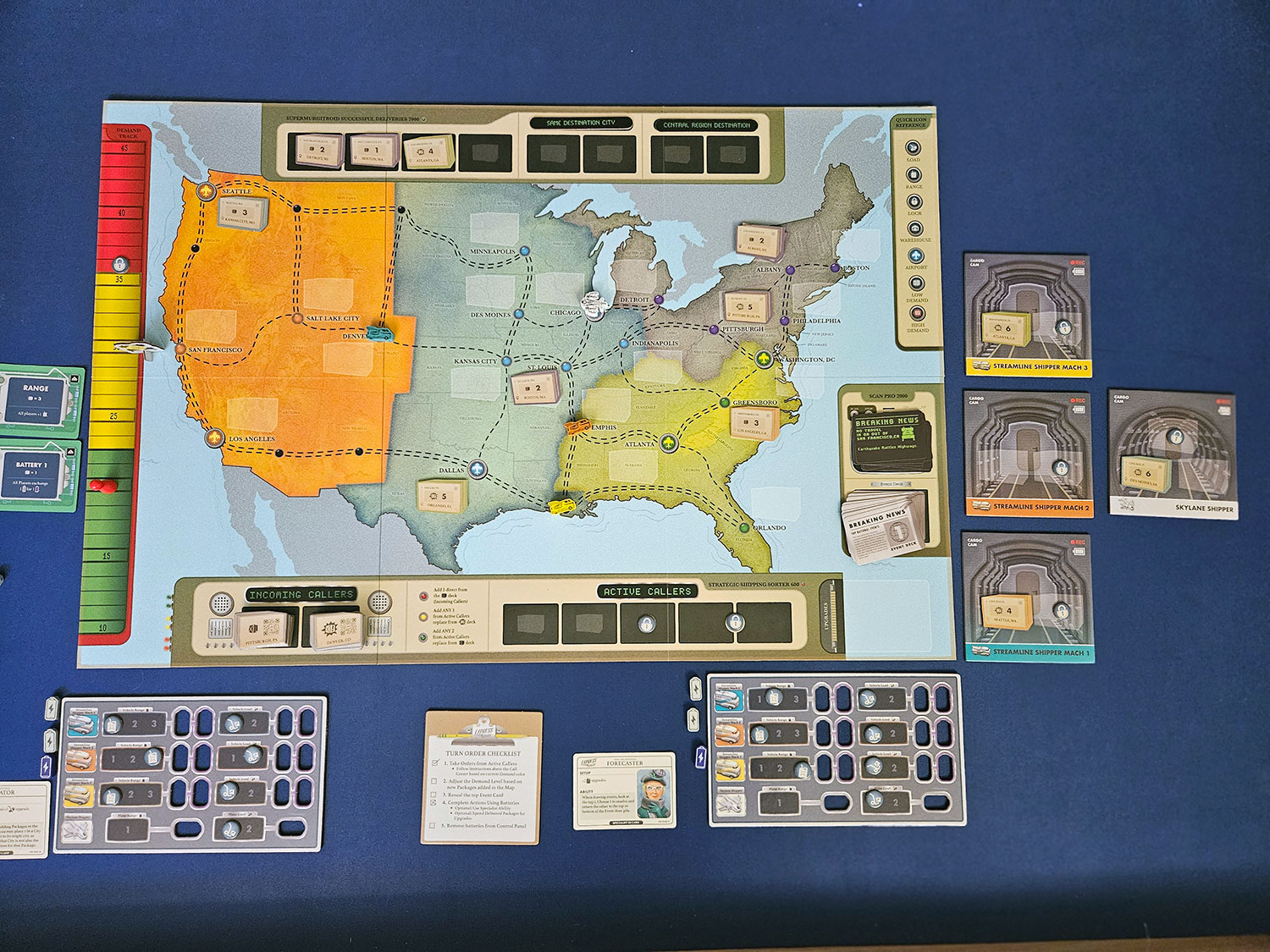
Game Experience:
Express Route does a lot right. It takes the tried-and-true formula of Pandemic and tweaks some of its most frustrating elements to make (what is in my mind) a more refined version of that formula. There’s two main differences between Express Route and Pandemic that make it stand out to me: neutral pawns everyone can control, and a less random event deck.
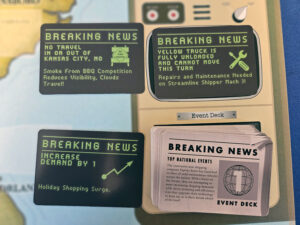
By making each pawn able to be controlled by each player, it makes each and every turn feel important. It gives each player an option to have a high impact each time they make a decision. When players control pawns individually, there are ebbs and flows of action effectiveness. In other co-ops, for instance, if you clear out an area, that’s a mighty powerful turn! However, that usually means that that player is stuck moving towards the next problem for a turn or two. By making each pawn controllable by everyone, it makes the work of moving a “useless” pawn a team game, spreading the ineffectiveness amongst all the players.
The Event Deck in this game is one of the best I’ve seen in a co-op experience. By making the Events last for one turn, they can be extremely obstructive. Wanted to move that pawn out of Chicago? Well too bad, because this round no one can enter or leave Chicago. Feel like you’re hitting your demand numbers effectively? Well the holidays hit and now demand is skyrocketing. The difference between these events and ones I’ve seen in other co-ops is that these events will not end the game for you as often as others. They are massive inconveniences that keep the game interesting all the way through, rather than obstructive events that strike fear into my heart. Honestly, I looked forward to the random events each round, which is a sentence I’d never thought I’d utter.
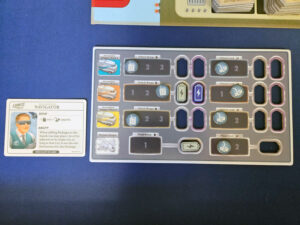
Honestly, my biggest complaint with the game is a sentiment that I cannot seem to shake: Express Route would have been Game of the Year in 2009.
So much from the early days of co-op design is still baked into this game, which makes the flaws of early co-op design drag this game down. Complete open information leads to quarterbacking. Simple turn structure with easily calculable game states leads to feelings of certainty about the game being winnable, or certainty that the game is already over (oh, and quarterbacking here too). While the design of Express Route is improved over some of the earliest co-op designs of the late 2000s, compared to the most popular games in today’s market, it feels several years too late for so little change.
Besides its outdated design, my next issue with the game is the theme. Now this is entirely subjective, but I feel that for a design that relies so heavily on its theme to carry its mechanics, Express Route just feels flat. Yes, the theme of package delivery comes through, but it’s so opaque that it feels more like a lifeless, efficiency Eurogame than it does a thematic co-op. While this may not be a problem for everyone, I typically come to co-ops and solo games for theme, and the lack of inspired thematic implementation was a bit of a let down.
Final Thoughts:
Express Route is a family-weight co-op game that brings delight through its unique spins on shared pawns and enticing events. It takes the oppressive atmosphere of other co-op games and really brings it down to a level that families can enjoy. However, if you’ve played a lot of co-op games in the past, Express Route will not show you anything you’ve not seen before, and its implementation of the theme is lacking compared to many other co-op games out there.
Final Score: 2.5 – Delivering packages isn’t all it’s cracked-up to be.
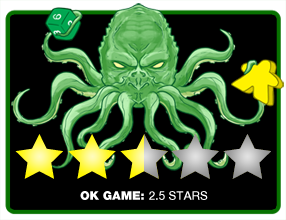 Hits:
Hits:
• Enticing, unique event cards
• Shared pawns increase engagement
• High-variability player powers
Misses:
• Tired co-op tropes
• Light on theme
• Middling production





















